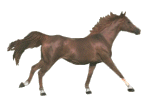| Author |
 Topic Topic  |
|
|
|
LastSerenade
Bronze Member
 
 England England
195 Posts |
 Posted - 08 Mar 2009 : 6:22:41 PM Posted - 08 Mar 2009 : 6:22:41 PM





|
Hi guys :)
Just wanted to ask a silly question really. My older (24ish) arab is sometimes a bit stiff a and slow at the start of a hack so a few people recommended glucosamine for him. I just wanted to check that this would be alright for him as he had laminitis last year and I don't want to be adding anything to his feed that could be harmful to him.
thanks 
|
|
Report to moderator
|
|
|
Otto
Bronze Member
 

England
119 Posts |
 Posted - 08 Mar 2009 : 7:09:34 PM Posted - 08 Mar 2009 : 7:09:34 PM




|
Glucosamine is one of those supplements that has mixed reputation. This is mainly because of its large molecular size which makes it difficult for some horses to digest and utilise. Certainly would be worth discussing its use with your vet with regard to the laminitis risk (although I don't think there is any firm evidence to support any link between glucosamine and insulin resistance in horses yet).
You might also want to consider trying Cartrophen. This is a substance that helps reduce the degradative enzymes caused by arthritis, which subsequently allows the cartilage to repair, and also heps reduce pain. It is not like Bute or Danilon as it is technically a naturally occurring substance. It is injected into muscle and can be used once a week for four weeks - my vet tells me the benefits can last for up to 18 months in some cases. My 31 year old mare has had the first 3 injections and already we are noticing a HUGE improvement in her joint mobility (reflected by the fact she is now tearing around the field like a 2 year old  ). It isn't cheap (approx £80 per injection) but I reckon over the course of 18 months it is cheaper than buying glucosamine, bute or danilon. So far I have only heard of good responses to Cartrophen - apparently there are no side effects. Might be a better option if there is any doubt about glucosamine and laminitis?? ). It isn't cheap (approx £80 per injection) but I reckon over the course of 18 months it is cheaper than buying glucosamine, bute or danilon. So far I have only heard of good responses to Cartrophen - apparently there are no side effects. Might be a better option if there is any doubt about glucosamine and laminitis??
Has anyone else tried using Cartrophen?? It is actually only licenced for dogs but equine vets seem very keen to use it.
|
      |
Report to Moderator  |
|
|
Sheena
Platinum Member
    

United Kingdom
1810 Posts |
 Posted - 11 Mar 2009 : 2:39:55 PM Posted - 11 Mar 2009 : 2:39:55 PM




|
Here's a really good link for Glucosamine - http://www.natural-animal-health.co.uk/glucosamine.htm
You might want to look at a Glucosamine/Chondroiton/MSM complex for the best results. Cortaflex contains all three I believe, definitly the first two - and is fabulous stuff if not a little pricey.
I don't think any herbal supplement should really affect Laminitus, but better to check with vet.
|
Alicia
     
|
Report to Moderator  |
|
|
x_Kath_x
Bronze Member
 
England
164 Posts |
 Posted - 11 Mar 2009 : 4:14:09 PM Posted - 11 Mar 2009 : 4:14:09 PM




|
| After several off and on bouts of being very stiff or lame and being diagnosed with sub-clinical laminitis (try getting vets to look for anything other than laminitis on a stiff mini that gets fat on thin air), one of my miniature Shetlands was found to have joint problems in his shoulder. After a period of box rest and anti-inflammatories the vet put him on Cosequin Equine to support his joints and he hasn't had a problem since (fingers crossed!). It is pricey but I've bought it online for £54 rather than the £78 I had to pay the vet and once you get past the loading period the maintenace dose is small so it lasts well. With his weight problems I'm sure she wouldn't have recommended it if it wasn't safe for laminitic prone horses but no harm in checking. |
     |
Report to Moderator  |
|
|
Crusaders Angel
Gold Member
   

England
531 Posts |
 Posted - 11 Mar 2009 : 4:51:57 PM Posted - 11 Mar 2009 : 4:51:57 PM




|
What ever joint supplement you decide to buy make sure you check to see if it contains Manganese. Apparently, the body can't utilise the chondroitin (or could be glucosamine, can't remember which one) if it is short of Manganese.
My mum went to the BETA trade fair in Feb and was talking to the people on the Equine America trade stand and they told her there was some new research being done in the USA on performance horses and they were having a better result from the horses that had Manganese added to their diet after previously being on joint supplement alone.
I've since added it to Angel's diet and there is a huge improvement.
She was previously on Sinequin but it stopped making much difference so I changed her on to Stride by TRM as it had more glucosamine and chondroitin + MSM but that was quite expensive so I changed her to PremierFlex from EquineAnswers which has more glucosamine, chondroitin and MSM and, as I was already feeding their 365 all in one supplement to Rio which contains manganese, I started adding some of that as well and the difference has been amazing. She is a lot quicker to warm up and let the handbrake off and has regained her fabulous floaty trot 
Just my experiences but hope they help
Lucy |
Report to Moderator  |
|
|
LastSerenade
Bronze Member
 

England
195 Posts |
 Posted - 11 Mar 2009 : 7:13:50 PM Posted - 11 Mar 2009 : 7:13:50 PM





|
| Thanks guys for the advice. I've actually been in touch with the people from Equine America. They're sending me some samples and info. They were actually really helpful :) |
Report to Moderator  |
|
|
Pasha
Platinum Member
    

England
3622 Posts |
 Posted - 12 Mar 2009 : 1:32:24 PM Posted - 12 Mar 2009 : 1:32:24 PM




|
I've tried everything on the market with Pasha (trust me) and the only thing that works for him is Equistro Flexadin! From the vet is it VERY expensive, but you can get it from Vets UK online for £48 (small tub which lasts just over a month) or £77 (large tub which lasts a few months): http://www.vetuk.co.uk/index.php?main_page=product_info&products_id=1267
The ingredients are:
Glocosamine HCI 99% pure 1800mg
Chondroitin Sulphate 95% pure 600mg
Harpagophytum (Devils Claw) 300mg
Manganese (Ipailigo) 16mg
When he was diagnosed with Cushings and had Insulin Resistance I took him off it as I was advised from a few people that Glucosamine is bad for IR horses. So I tried various different herbal remedies which didn't contain Glucosamine and he wouldn't eat them! in fact, because I had 'poisoned' him, he wouldn't eat anything from me fro a few days!!
So then I tried Global Herbs Move Free Liquid - doesn't work! he's stiffer than ever!
Saw my vet yesterday and he does not support the claims that Glucosamine is bad for IR horses and has told me to put him back on Flexadin asap, so I have one arriving tomorrow! Within 3-4 days he'll be pinging around again  It really is fantastic stuff It really is fantastic stuff 
|
    |
Edited by - Pasha on 12 Mar 2009 1:35:06 PM |
Report to Moderator  |
|
|
ACGODFREY
Silver Member
  
United Kingdom
440 Posts |
 Posted - 15 Mar 2009 : 1:33:15 PM Posted - 15 Mar 2009 : 1:33:15 PM




|
Hi,
I started my boy off with Cosequin (then aged 4) and kept him on it for about a year before changing to Aviform Suppleaze Gold. There was no change in his movement when I changed from Cosequine. However, I am not sure there was any change when he started ont he Cosequine either! He has true navicular disease and DJD in one stifle  and I started supplementing on the recommendation of the vet. I'm actually pondering on taking him off any supplements and seeing if there is any difference. and I started supplementing on the recommendation of the vet. I'm actually pondering on taking him off any supplements and seeing if there is any difference.
Otto, he had a course of Cartrophen once weekly for four weeks, more because the usual treatments (steriods/HA injections) had no positive effect. Again, I don't know whether it made any difference as he's also had remedial farriery since his diagnosis and has not been worked. My vet said they had very good results with Cartrophen for arthritic horses and the evidence on canines is substantial. I posted at the time asking if anyone had experience of it on equines, but only got responses re. canines. If I had an older, generally stiff horse I would certainly give it a go. Like you say, it is not licensed for horses, and is expensive, but not as expensive as the supplements are!
Good luck. |
Report to Moderator  |
|
|
garnet
Platinum Member
    

2382 Posts |
 Posted - 17 Mar 2009 : 10:04:53 PM Posted - 17 Mar 2009 : 10:04:53 PM




|
Garnet has been having Cartrophen every 6 months for about the last 6 years and is also on Cortaflex on vet's advice and Super Solvitax RA. She is almost 26 and has big stiff knees and has been retired for 2 years. She looks well and gallops round the field when it suits her. She has had several episodes of getting stuck down in the field when she lies the wrong way on a slope when the ground is slippy and since the last one I have decided to keep her on Cortaflex HA (I used to alternate with the cheaper one). She lives out all the time as she throws a tantrum if I try to put her in a stable. I think the Cartrophen probably extended her ridden career - she got over the lameness when her first knee started to get big and was able to carry on competing.
I am also giving Cortaflex to Jim the Cob with the vet's approval. He is 16 and had laminitis about 5 years ago and I am hoping to prevent any joint problems in later life. |
      |
Report to Moderator  |
|
| |
 Topic Topic  |
|

